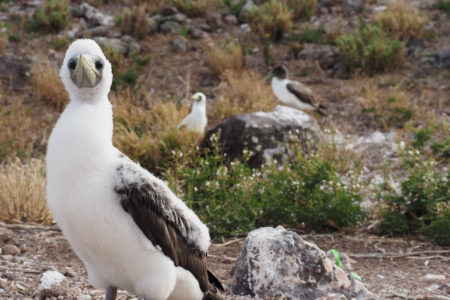Invasive Species Working Group

In insular ecosystems like the Caribbean, invasive species are responsible for two-thirds of extinctions and represent the greatest current threat to biodiversity. Invasive species are the primary threat to Caribbean seabird populations as well as many endemic plants, birds, and reptiles. After invasive species have been eradicated from uninhabited or lightly populated islands around the world, populations of seabirds and other sensitive species have increased dramatically.
The goal of the Invasive Species Working Group is to advance eradication as a conservation tool. Successful projects over the last few years show the benefits and exciting results for conservation of birds and other fauna and flora in the Caribbean follow the removal of invasive species like rats, mongoose, and feral goats on sensitive offshore islands that are not adapted to to the mammals.
Working Group Chairs: Kirsty Swinnerton and Lyndon John
Blog Articles
Redonda Rebounded—Magical transformation spells brighter future for Redonda’s wildlife
The Mystery of the Missing Todies: Understanding the Impacts of Invasive Mammals
Workshop Reports
Workshop on Eradicating Invasives for the Benefit of Caribbean Seabirds from the 2009 BirdsCaribbean (formerly SCSCB – Society for the Conservation and Study of Caribbean Birds) Meeting in Antigua, click here to read the report on the web and access the presentations, click here to download it in Word.
Reports from recent related sessions at BirdsCaribbean (SCSCB) meetings: 2007 Working Group Meeting Report (in Word)
Invasives Species Working Group Report from SCSCB Meeting in Guadeloupe, July 2005 – published in Journal of Caribbean Ornithology 18: 107–108 (pdf)
Report from Workshop on Invasive Species and Other Problem Birds in the West Indies, SCSCB Meeting, Tobago, July 22, 2003 (Word)
Island-Specific Invasive Vertebrate Data Compilation
Island Conservation is spearheading an effort to collect information on the presence of invasive vertebrates and factors relevant to their eradication. A “Caribbean Seabird Restoration – Invasives Mammal Datasheet” has been created to share what you know about any island’s invasive mammals (or other vertebrates) and/or the social and political context relevant to eradication projects.
Other Data Repositories Relevant to Invasive Species
OBIS-SEAMAP (Ocean Biogeographic Information System, Spatial Ecological Analysis of Megavertebrate Populations). This global program, hosted at Duke University, seeks to organize marine mammal, seabird and sea turtle spatial data to advance conservation and collaboration. Contributors include Environmental Protection In the Caribbean (EPIC), who are undertaking standardized breeding colony surveys in the Lesser Antilles region as well as collecting information on invasive species at these sites. See http://seamap.env.duke.edu/datasets/detail/418. For more information, visit: EPIC or contact Natalia Collier at EPIC.
National Invasive Species Information Center: Gateway to invasive species information; covering Federal, State, local, and international sources, a wealth of information!
Global Invasive Species Database: Aims to increase awareness about invasive alien species and to facilitate effective prevention and management activities. Website is managed by the Global Invasive Species Specialist Group of the Species Survival Commission of the IUCN-World Conservation Union.
Invasives Resources and Reports
Related Powerpoint Presentations at BirdsCaribbean’s Regional Meeting in 2009 (available for download as PDFs):
- The Power of Invasive Vertebrate Removal for the Conservation of Island Species: Its Potential in the Caribbean
- Seabirds and Invasive Species: Targeting Islands in the Caribbean for Eradication of Invasive Mammals
- Prioritizing Conservation Action in the Caribbean Region: A Case Study from the Polynesia/Micronesia Biodiversity Hotspot
Invasive Species in the UK Overseas Territories Report (Word), pre-workshop document, includes comment on a number of territories in our region. Very useful and interesting summary highlighting the islands’ importance for biodiversity; the extent of the problem; the need for greater research; successful and on-going projects; bio-security concerns; the need for legislation; training requirements; and funding needs.
Invasive species Workshop Outcomes – UK Overseas Territories (Word) – The WG comments that “this is particularly pertinent to our own discussions. We do not have the capacity to undertake information gathering, research, eradication methods etc—let alone the funding. The document states “use of current networks is preferably than creating new ones”—something we recommended in terms of providing a resource base informing people where they can go to obtain information.”
Anguilla Invasives Workshop Report (PDF) – excellent report and shows a procedure that might be replicated in over countries. If you read though this document, you will notice that there is much information available on the JNCC website.
Invasive Species Threats in the Caribbean Region: Report to the Nature Conservancy. 2003. Prepared by Moses Kairo et al. CAB International. 132 pages (PDF)
Solving The Mystery Of Centuries-old Caribbean Ant Plagues, Jan. 2005. Science Daily Article about Harvard entomologist Edward O. Wilson’s on Caribbean-island ant plagues.
The Science of Invasive Species: An Information Update by the Union of Concerned Scientists, November 2001 (PDF)
What You Can Do to Prevent Species Invasions, Union of Concerned Scientists (prepared by L. Sorenson) (PDF)
Other Invasive Species Links
Island Conservation: science-driven, non-profit organization dedicated to preventing extinctions and protecting natural ecological and evolutionary processes on islands. Main focus is on eradicating harmful introduced species from islands.
The Antiguan Racer Conservation Project: The amazing story of how a vanishing species (found only in Antigua) was saved from extinction through an invasives eradication project.
Union of Concerned Scientists Invasive Species Program: information on invasives science and UCS’ policy work.
